- Home
- Charlaine Harris
Sweet and Deadly aka Dead Dog
Sweet and Deadly aka Dead Dog Read online
Sweet and Deadly aka Dead Dog
Charlaine Harris
Now best known for her New York Times bestselling Sookie Stackhouse novels, Charlaine Harris hit "a home run the first time out" (Birmingham News) with the story of a murder that embroils a small-town reporter in mystery that hits close to home…
Catherine Linton has returned to her hometown of Lowfield, Mississippi, unconvinced that the death of her parents in a car crash six months earlier was an accident. And her suspicions are confirmed when she stumbles upon the dead and beaten body of her doctor-father's longtime nurse. There are secrets being kept in Lowfield. And the town where Catherine grew up may be the same place where she is sent to her grave…
Charlaine Harris
Sweet and Deadly aka Dead Dog
© 1980
To Hal, who made this possible
1
SHE PASSED A dead dog on her way to the tenant shack.
It was already stiff, the legs poker-straight in rigor. It had been a big dog, maybe dun-colored; with only a quick glimpse, Catherine could not be sure. It was covered in the fine powdery dust that every passing vehicle threw up from the dirt road in the dry Delta summer.
In her rearview mirror she saw the cloud raised by her passage hanging in the air after she had passed, a cloud dividing endless rows of cotton. But the road was too poor to allow many backward glances.
She wondered briefly why someone had been driving so fast on the caked and rutted dirt that he had not seen the dog in time to swerve.
A sideways look at the cotton told Catherine that it would make a sad crop this year. The heat had lasted too long, unbroken by rain.
This land was Catherine’s, had been her great-grandfather’s; but Catherine rented it out as her father had done. She was glad she did as she recalled her grandfather’s irascibility in bad years, when she had ridden with him across “the place,” as cotton planters called their acres.
She didn’t remember the heat of those dim summers equaling the ferocity of this one. Even this early in the morning, with dawn not too long past, Catherine was beginning to sweat. Later in the day the glare would be intolerable, without considerable protection, to all but the swarthiest. To someone of Catherine’s whiteness of skin it would be disastrous.
She pulled to a stop under an oak, killed the motor and got out. The oak was the only tree to break the stretch of the fields for miles. She stood in its sprawling shadow with her eyes closed, the heat and silence enveloping her. She wrapped herself in them gladly.
The silence came alive. A grasshopper thudded its way across the road from one stand of cotton to the next. A locust rattled at her feet.
She opened her eyes reluctantly and, after reaching into the car for the things she had brought with her, began to walk down the road to the empty tenant shack standing to one side of the intersection of two dirt roads.
The fields were empty of tractors and farm hands. Nothing stirred in the vast brilliant flatness but Catherine.
The sack in her left hand clanked as she walked. The gun in her right hand reflected the sun.
Her mother had raised her to be a lady. Her father had taught her how to shoot.
Catherine laid the gun on a stump in the packed-dirt yard of the tenant house. The bare wood of the house was shiny with age and weathering. A few traces of red paint still clung in the cracks between the planks.
It’ll all fall down soon, she thought.
The outhouse behind the shack had collapsed months ago.
Under the spell of the drugging heat and hush, she made an effort to move quietly. The clank of the empty cans was jarring as she pulled them out of the sack and set them in a neat row across the broad stump.
She hardly glanced at the black doorless hole of the shack’s entrance. She did notice that the sagging porch seemed even closer to deserting the rest of the house than it had the last time she had driven out of town to shoot.
The dust plumed under her feet as she paced away from the stump. She counted under her breath.
A trickle of sweat started down the nape of her neck, and she was irritated that she had forgotten to bring an elastic band to lift the black hair off her shoulders.
The twinge of irritation faded as she turned to face the stump. Her head bowed. She concentrated on her body’s memory of the gun.
In one motion, her head snapped back, her knees bent slightly, her left hand swung up to grip her rising right forearm, and she fired.
A can flew up in the air, landing with a hollow jangle under the steps rising to the porch. Then another. And another.
By the time only one can was left, Catherine was mildly pleased with herself. She dampened her self-congratulations with the reflection that she was, after all, firing from short range. But then, a.32 was not meant for distance shooting.
The last can proved stubborn. Catherine emptied the remaining bullets from the gun at it. She cursed mildly under her breath when the can remained obstinately unpunctured and upright.
It’s a good time for a break, she decided.
She trudged back to the stump and collapsed, with her back against its roughness. Pulling a plastic bullet box from a pocket in her blue jeans, she set it on the ground beside her. She eased the pin from the chamber, letting it fall into her hand. She reloaded lazily, full of the languorous peace that follows catharsis.
When the gun was ready, she didn’t feel like rising.
Let the can sit, she thought. It deserves to stay on the stump.
She was enjoying the rare moment of relaxation. She laced her fingers across her stomach and noticed that they were leaving smudges on her white T-shirt. Her jeans were coated with dust now. She slapped her thigh lightly and watched the motes fly up.
I’ll go home, she thought comfortably, and pop every stitch I have on into the washer. And I’ll take a long, long shower. And then-
There was no “then.”
But I’m better, she continued, smoothly gliding over the faint uneasiness that had ruffled her peace. I’m better now.
A horsefly landed on her arm, and she slapped at it automatically. It buzzed away in pique, only to be replaced in short order by one of its companions.
“Damn flies,” she muttered.
There sure are a lot of them, she thought in some surprise, as another landed on her knee. Attracted by my sweat, I guess.
That settled it. She would gather up the cans and go back to Lowfield, back to her cool quiet house.
Catherine rose and walked toward the dilapidated porch briskly, slapping at her arms as she went.
The flies were whirring in and out of the open doorway, creating a drone in the stillness. The boarded-up windows of the house and the overhanging roof of its porch combined to make a dark cave of the interior. The sun penetrated only a foot into the entrance, so the darkness seemed impenetrable by contrast.
She stooped to pick up the first can she had hit, which was lodged under the lopsided steps. The stoop leveled her with the raised floor of the house, built high to avoid flooding in the heavy Delta rains. As she reached for the punctured can, something caught at the corner of her eye, an image so odd that she froze, doubled over, her hand extended for the can.
There was something in that little pool of light penetrating the empty doorway.
It was a hand.
She tried to identify it as something else, anything else.
It remained a hand. The palm was turned up, and the fingers stretched toward Catherine appealingly. Catherine’s eyes flicked down to her own extended fingers, then back. She straightened very slowly.
When she inhaled, she realized she had been holding her breath against the smell. It was a whiff of the sam
e odor she had caught as her car passed the dead dog.
With no thought at all, she grasped one of the supports that held up the roof over the porch. Moving quietly and carefully, she pulled herself up on the loose rotting planks and took a little step forward.
A fly buzzed past her face.
The blinding contrast of sun and gloom lessened as she crept closer. When she reached the doorway she could see what lay inside the shack.
The hand was still attached to a wrist, the wrist to an arm…
It had been a woman.
Her face was turned away from Catherine. Even in the dimness, Catherine could make out dark patches matting the gray hair. She realized then what made the head so oddly shaped.
A fly landed on the woman’s arm.
Catherine began shaking. She was afraid her knees would give way, that she would fall on top of the stinking thing. Her stomach began to twist.
She backed away, tiny shuffling steps that took all her concentration. Her arm touched a wooden support. She had reached the edge of the porch.
She turned to grip the support, then lowered a foot until it rested firmly on the ground.
She reached the stump and sat on its uneven surface, with her back to the tenant house. She stared across her land.
“Oh my God,” she whispered.
And the fear hit her. After a stunned second she scrabbled in the dust for her gun.
Her eyes darted around her, searching.
Nothing moved on the road, or in the fields; but she felt terrifyingly exposed in that vast flatness.
The car. She had to make it to the car. It was only a few yards away, parked under the oak’s inadequate shade. All she had to do was cross those yards. But she was frozen in position like an animal caught in headlights.
The sheriff, she thought with sudden clarity. I’ve got to get Sheriff Galton.
With that thought, that plain plan, she was able to launch herself from the stump.
She opened the door and shoved the pistol to the other side of the car with shaking fingers, then slid into the driver’s seat. Shut the door. Locked it. She managed to turn the key in the ignition before her muscles refused to obey her. Her fingers on the gearshift were too palsied to put the car into drive.
She screamed at her helplessness. She covered her ears against the ragged sound.
But with that release, her shaking lessened. She could put the car in gear and start back home to Lowfield.
2
THERE WERE TWO houses where the dirt road joined the highway. Catherine could have stopped at either and found help.
She never thought of it. In a fog of shock she had fixed her destination, and she would not stop until she reached it. She drove south on the highway without seeing anything but the concrete in front of her.
To reach the sheriff ’s office, she had to turn off the highway into the town. When she saw the familiar brick building sitting squarely in front of the old jail, Catherine felt dizzy with relief.
The lights inside the little building were on. Through the glass door Catherine could see the dispatcher, Mary Jane Cory, seated at her desk behind the counter.
It took an immense effort of will to unclamp her hands from the wheel, open the car door, swing her legs out, and force the rest of her body to follow them.
“Good morning, Catherine! I’ll be with you in a minute,” Mrs. Cory said briskly, and thudded out a few more words on her ancient typewriter.
In what later seemed to Catherine insanity, she kept silent and waited obediently. She leaned on the counter, her hands gripping the far edge of it to keep upright.
That silence alerted some warning signal in Mary Jane Cory. She gave Catherine a second glance and then was on her feet, her hands covering Catherine’s.
“What’s the matter?” the older woman asked sharply.
“The sheriff…I want to see the sheriff,” Catherine said painfully. Her jaws ached from long clenching.
“Are you going to faint, Catherine?” Mrs. Cory asked, still in that sharp watchful voice.
Catherine didn’t answer.
Mrs. Cory switched her grip from Catherine’s hands to her upper arms and called without turning her head, “James Galton! Come here quick!”
There was a stir in the office that had “Sheriff” on the door. The roar of the air conditioning covered the sound of Galton’s quiet steps, but a khaki-covered elbow appeared in Catherine’s range of view, propped on the counter beside her.
“You got troubles, Catherine?” rumbled a carefully relaxed voice. Catherine saw Mrs. Cory’s platinum head give a shake in answer to some silent query of Galton’s.
Now that the time had come to deliver her message, Catherine found herself curiously embarrassed, as if she were about to commit a deliberate faux pas.
She turned her head stiffly to look up at Galton.
“There’s a dead woman in an old tenant house. On the place.”
“You sure she’s dead?”
Catherine’s face was blank as she stared at him. “Oh, yes,” she said.
“A black woman?”
“No,” she said, and felt the ripple of surprise. Lowfield white women did not get themselves dumped in tenant shacks.
“Do you know who it is?”
“No. No.” Her voice sounded odd to her own ears. “She’s covered in blood.”
Galton’s face changed as she stared at him. He didn’t look like the relaxed and genial Jimmy Galton who had been her father’s friend.
He looked like the sheriff.
Catherine had assumed she could go home after informing the sheriff of her discovery.
She had, she soon realized, been thinking like a child.
Galton issued a few commands to Mrs. Cory, who got busy on the radio and telephone. He gently but quite firmly led Catherine into his office, guided her to the chair in front of his desk, and then eased himself into his own battered chair.
“You want to go to the doctor for a tranquilizer?”
But the doctor was her father. He was dead.
No, she thought, horrified. No. She shook her head to clear her thoughts. This kind of confusion hadn’t happened to her in a long time; she had thought it was over with.
“Want something to drink?”
“No,” she whispered.
He indicated his pack of cigarettes.
Catherine forced herself to reach for one and light it, while Galton eyed her intently.
He’s trying to see if I can do it by myself, Catherine thought suddenly. Her back stiffened.
“Now, I’m going to ask you a few questions. You just take your time answering,” he said.
Catherine nodded briefly.
He was being kind in a stern way, but Catherine realized that the day would be longer than she had ever imagined when she arose early that morning to go target shooting.
Galton jogged her with a couple of questions. Once she got going, she gave a clear account of her morning.
There was nothing much to tell.
When she finished, Galton rose without a word, patting her absently as he passed into the outer room.
Catherine heard a shuffling of feet in the main office, a murmur of voices. Mrs. Cory had called in the deputies.
Catherine looked down at her hands clenched in her lap. Her heavy dark hair swung forward, shielding her face, giving her a tiny corner of privacy against the open door.
The look of her twined fingers, the smell of the sheriff ’s office, and the scrape of official boots had ripped the cover from a well of memory. For a few moments she was not in Lowfield but in a similar police station in a similar tiny town, in Arkansas. She was not wearing blue jeans but the dress she had worn to work that day. Her parents had been dead for four hours instead of six months.
With a terrible effort, she wrenched herself back into her proper place.
I will not give way, she told herself ferociously. I will get through this and I will not give way.
She listened t
o Sheriff Galton’s voice rumbling in the main office. He was telling Mary Jane Cory to call enough men for a coroner’s jury.
She rode back to the shack in the sheriff ’s car. The car was bright green with gold lettering and a star on the side. She could see people glancing in as the sheriff drove past, then looking again as they identified Galton’s passenger as Catherine Linton.
Though she had cut herself off from the mainstream of life in Lowfield, Catherine was fully aware that the talk would already be beginning. A month ago, it would not have occurred to her to care.
“Catherine,” Galton said.
She looked at him.
“Who rents your place?”
“Martin Barnes,” she said promptly.
She slid easily back into her silence. It had been her natural element for months; and even before that, she had not been what anyone would call talkative. Her roommate in college had called her “Sphinx.” It had become her accepted name on the small private campus.
She wished there was someone around to call her that now.
Martin Barnes. That was food for thought. Catherine supposed the person most familiar with that piece of land must be the most suspected. The shack was visible, but not obvious, from the highway. You wouldn’t, Catherine decided, just glimpse it and say, “Perfect place for this body I have on my hands.” But Mr. Barnes can’t have anything to do with this, she thought. He’s-older than my father; he’s a good man. Besides-she must have been raped. Why else would anyone drag a lady out to the country and bash her on the head?
But the woman’s dress hadn’t been disarranged. Catherine could see it clearly, pulled down around the woman’s knees. A print shirtwaist dress, an everyday dress, short-sleeved for the summer. The kind of dress any older woman in Lowfield would wear to go to the grocery. Not a dress any woman would wear to die in.
Robbery, then? Catherine wondered. Had there been a purse at the woman’s side? She couldn’t recall one-and she could still see the body clearly. She shuddered, and her small square hands gripped her folded arms.

 Dead Ever After
Dead Ever After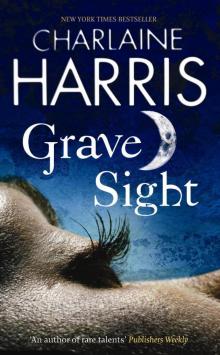 Grave Sight
Grave Sight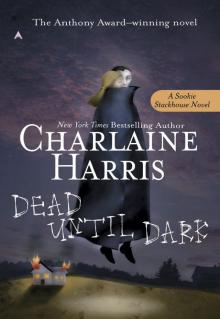 Dead Until Dark
Dead Until Dark Real Murders
Real Murders Wolfsbane and Mistletoe
Wolfsbane and Mistletoe All the Little Liars
All the Little Liars Dead to the World
Dead to the World Club Dead
Club Dead Dead in the Family
Dead in the Family The Sookie Stackhouse Companion
The Sookie Stackhouse Companion All Together Dead
All Together Dead Dead as a Doornail
Dead as a Doornail Sleep Like a Baby
Sleep Like a Baby Night Shift
Night Shift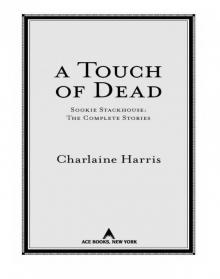 A Touch of Dead
A Touch of Dead Living Dead in Dallas
Living Dead in Dallas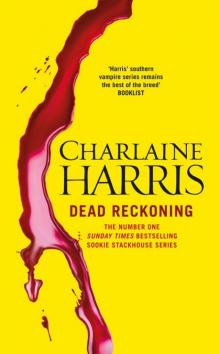 Dead Reckoning
Dead Reckoning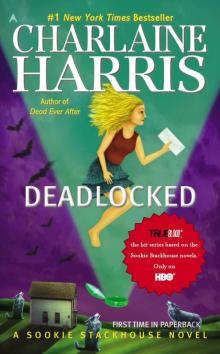 Deadlocked
Deadlocked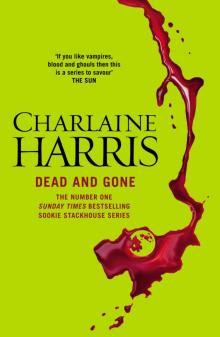 Dead and Gone
Dead and Gone From Dead to Worse
From Dead to Worse Definitely Dead
Definitely Dead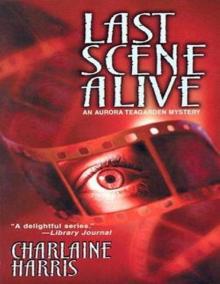 Last Scene Alive
Last Scene Alive Grave Secret
Grave Secret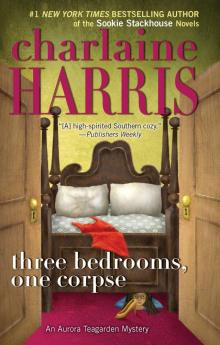 Three Bedrooms, One Corpse
Three Bedrooms, One Corpse The Russian Cage
The Russian Cage Shakespeares Counselor
Shakespeares Counselor Dead of Night
Dead of Night Shakespeares Trollop
Shakespeares Trollop One Word Answer
One Word Answer Shakespeares Champion
Shakespeares Champion Shakespeares Christmas
Shakespeares Christmas Shakespeares Landlord
Shakespeares Landlord Poppy Done to Death
Poppy Done to Death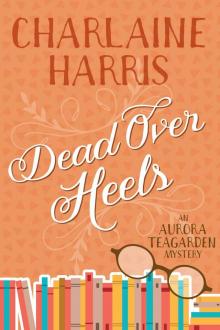 Dead Over Heels
Dead Over Heels An Ice Cold Grave
An Ice Cold Grave The Julius House
The Julius House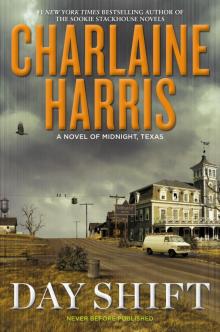 Day Shift
Day Shift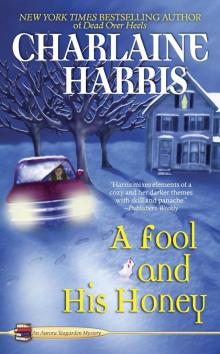 A Fool And His Honey
A Fool And His Honey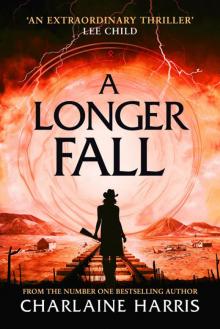 A Longer Fall (Gunnie Rose)
A Longer Fall (Gunnie Rose) The Complete Sookie Stackhouse Stories (Sookie Stackhouse/True Blood)
The Complete Sookie Stackhouse Stories (Sookie Stackhouse/True Blood)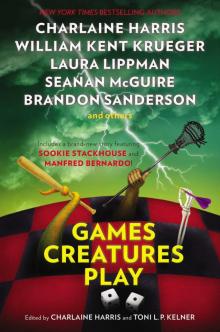 Games Creatures Play
Games Creatures Play Death's Excellent Vacation
Death's Excellent Vacation (LB2) Shakespeare's Landlord
(LB2) Shakespeare's Landlord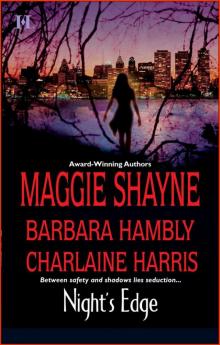 Dancers In The Dark - Night's Edge
Dancers In The Dark - Night's Edge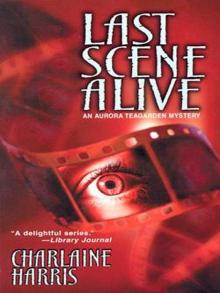 Last Scene Alive at-7
Last Scene Alive at-7 Deadlocked: A Sookie Stackhouse Novel
Deadlocked: A Sookie Stackhouse Novel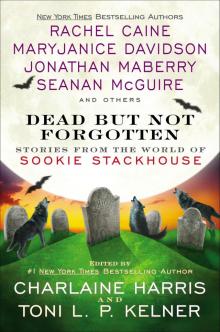 Dead But Not Forgotten
Dead But Not Forgotten (4/10) The Julius House
(4/10) The Julius House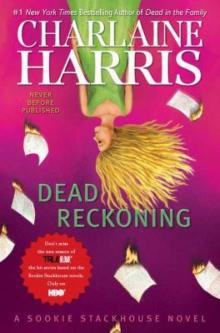 Dead Reckoning: A Sookie Stackhouse Novel
Dead Reckoning: A Sookie Stackhouse Novel A Touch of Dead (sookie stackhouse (southern vampire))
A Touch of Dead (sookie stackhouse (southern vampire))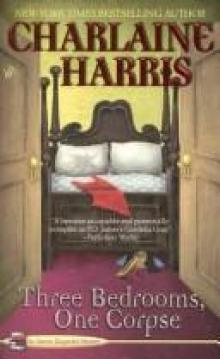 (3T)Three Bedrooms, One Corpse
(3T)Three Bedrooms, One Corpse An Easy Death
An Easy Death A Secret Rage
A Secret Rage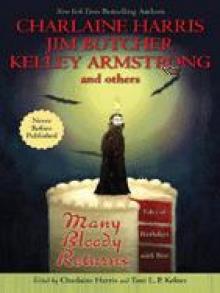 Many Bloody Returns
Many Bloody Returns![Harper Connelly [3] An Ice Cold Grave Read online](http://i1.bookreadfree.com/i/03/25/harper_connelly_3_an_ice_cold_grave_preview.jpg) Harper Connelly [3] An Ice Cold Grave
Harper Connelly [3] An Ice Cold Grave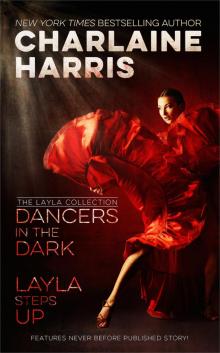 Dancers in the Dark and Layla Steps Up
Dancers in the Dark and Layla Steps Up Small Kingdoms and Other Stories
Small Kingdoms and Other Stories Dead Ever After: A Sookie Stackhouse Novel
Dead Ever After: A Sookie Stackhouse Novel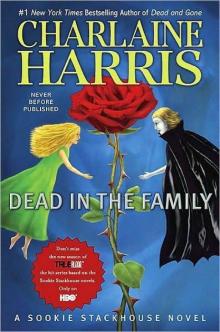 Dead in the Family ss-10
Dead in the Family ss-10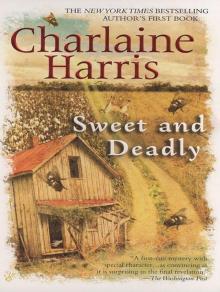 Sweet and Deadly aka Dead Dog
Sweet and Deadly aka Dead Dog An Easy Death (Gunnie Rose #1)
An Easy Death (Gunnie Rose #1) The Complete Sookie Stackhouse Stories
The Complete Sookie Stackhouse Stories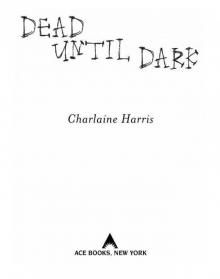 Sookie Stackhouse 8-copy Boxed Set
Sookie Stackhouse 8-copy Boxed Set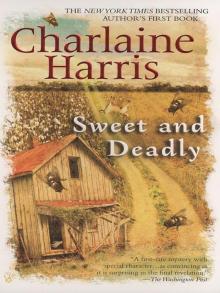 Sweet and Deadly
Sweet and Deadly Crimes by Moonlight
Crimes by Moonlight Dead Ever After: A True Blood Novel
Dead Ever After: A True Blood Novel Dead Ever After ss-13
Dead Ever After ss-13 After Dead
After Dead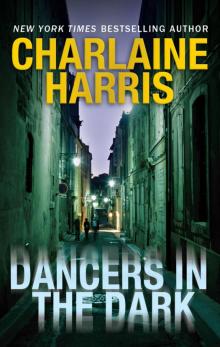 Dancers in the Dark
Dancers in the Dark (LB1) Shakespeare's Champion
(LB1) Shakespeare's Champion A Bone to Pick (Teagarden Mysteries,2)
A Bone to Pick (Teagarden Mysteries,2)